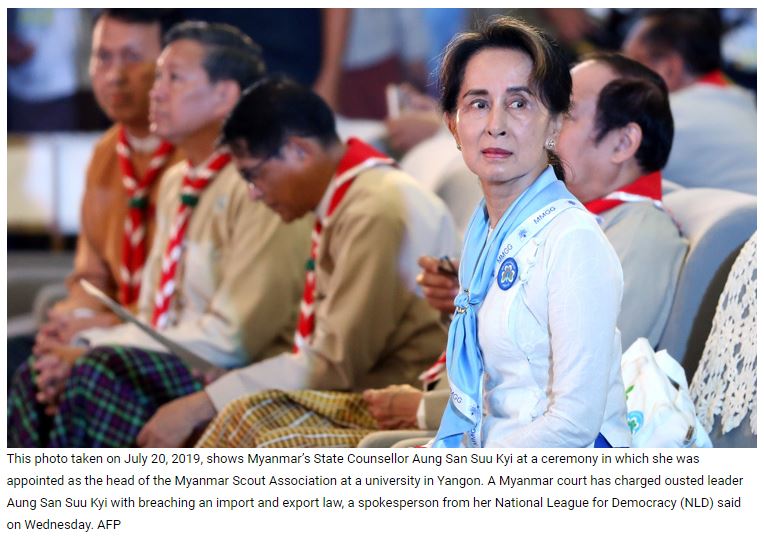Regional economies’ investment gains from Myanmar coup a poser
Myanmar’s army seized power on Monday this week, detaining Nobel Peace Prize winner Aung San Suu Kyi and cutting short a transition to democracy in a takeover that has drawn condemnation from the United Nations, the United States and other Western countries.
UN chief Antonio Guterres warned the world must rally to ensure the military putsch fails.
It was reported a military team from the commander-in-chief’s office searched Aung San Suu Kyi’s residence at 6.30am on Monday. Aung San Suu Kyi and other senior figures from the ruling party were detained in an early morning raid on the same day.
Army chief Min Aung Hlaing seized power on the grounds of alleged fraud in the Nov 8 election, which the National League for Democracy (NLD) won in a landslide. The electoral commission had said the vote was fair.
Min Aung Hlaing appointed himself head of a new Cabinet stacked with former and current generals, justifying his coup as the “inevitable” result of civilian leaders’ failure to heed the army’s fraud warnings.
The recent political development in Myanmar raised a lot of concerns from investors who are now frantically looking at divesting funds primarily back to China, which was the only growing economy worldwide in 2020 despite the pandemic, said Van David, a local entrepreneur and public-private partnership advocate.
The pressing question Khmer Times posed is whether Cambodia could seize on an opportunity from the divestment out of Myanmar or which other countries in ASEAN could be favourable for the possibly displaced foreign direct investment.
David reponded that time will tell on the economic consequences for Cambodia, mentioning the Kingdom had missed out a few years ago when investors divested out of China as a result of the US-China trade war, while Vietnam and Indonesia benefited the most among ASEAN countries as a consequence of it.
David added: “We must commend the Cambodian government for nearly finalising its new law on investments (LOI) although it will take some time for endorsement by parliament and enactment into law.
It also would not suffice that the new LOI contains generous specific incentives. Our infrastructure and our skilled manpower pool is acutely behind our giant immediate neighbours, creatin strong impediments too.”
“Therefore, we firmly hope the government’s determined will to leap-frog [rivals] would materialise into a more cohesive and integrated approach in the implementation of the new law,” David added.
American Chamber of Commerce in Cambodia President Anthony Galliano said Myanmar is probably off the table for most international investors, given the recent military coup and the potential for political and economic instability.
Galliano said Cambodia, with its unprecedented track record on containing the COVID-19 pandemic and resilient economy, would be attractive, as would be Vietnam as it has a rising manufacturing hub, strategic location, growing middle class and is n investor favourite. Southeast Asia’s largest economy, Indonesia, is also another favourable investment destination.
“I believe investors are concerned that the new government may nationalise certain sectors, limit foreign ownership or do something worse. Myanmar is not an attractive market to invest in presently until there is visibility of the new government’s intentions and investment policy. It is not expected to be business as usual,” Galliano said.
Dr Jayant Menon, visiting senior fellow with the ISEAS-Yusof Ishak Institute – a Singaporean statutory board and research institution established by an Act of Parliament in 1968, said Vietnam is one of the few ASEAN countries that has been able to avoid a recession and is recording quite strong growth. It is an increasingly attractive site for foreign investment.
“It is unlikely that Cambodia will benefit greatly from any investment diverted from Myanmar because, apart from garments, it doesn’t really compete for the same types of investment,” Menon added.
He said the military coup in Myanmar was unexpected and caught a lot of investors and foreign firms that been had banking on a permanent switch to democracy off-guard. Although it will have immediate significant negative effects on business confidence and foreign investment, it is too early to judge long-term effects.
Myanmar’s military announced the country is now under a state of emergency for one year.
However, ACLEDA Microfinance Myanmar, which is a subsidiary of ACLEDA Bank Plc, reports that business is running normally, according to Executive Vice-President and Group Chief Financial Officer Mar Amara.
“So far there has been no impact or concern regarding the coup in Myanmar that affects our financial institution,” she said.
Source: https://www.khmertimeskh.com/50810943/regional-economies-investment-gains-from-myanmar-coup-a-poser/


 Thailand
Thailand




